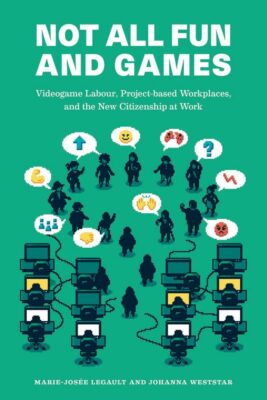The bulk of research-based literature on video games has traditionally focused on content, but Marie-Josée Legault and Johanna Weststar’s book seeks specifically to address the challenges faced by the workers behind these games. Deconstructing the framework of labour characterized by project-based work, Not All Fun and Games offers a rigorously researched and thorough analysis of the industry behind the media and the status of citizenship among game developers at work. The title is timely, as the industry on a global scale is facing record numbers of layoffs as well as studio closures in the aftermath of the pandemic media boom, while employees continue to bear the worst of the consequences.

Not All Fun and Games
Videogame Labour, Project-based Workplaces, and the New Citizenship at Work
Marie-Josée Legault and Johanna Weststar
University of Concordia Press
$59.95
paper
408pp
9781988111490
The straightforward and academic approach to their research reframes the vulnerabilities unique to game developers in the video game industry; individuals’ poor treatment is presented alongside clear statistical evidence of corporations’ efforts against practiced citizenship in the workplace. A particularly stark example is the industry-wide term “crunch,” a stand-in for unlimited, unpaid overtime taken on voluntarily by game developers, albeit in the face of social and professional pressure from upper-level management. The problem is widespread and insidious; the industry’s culture and language has been cultivated to obscure the harsh realities of careers with next to no job security, restrictive NDA and NCA agreements (which often don’t hold up to legal scrutiny), and work environments systemically hostile to minorities. This, they write, is a consequence of “the unchecked power of corporations” and the risk of commercial failure relegated to workers with no actionable power.
Though the book – understandably – doesn’t venture into a one-union-fits-all solution, Legault and Weststar provide the reader with considerable insight on how citizenship for game developers could be approached, laying the groundwork based on previous successful – and unsuccessful – movements in the industry. We’ve seen large-scale shifts when public pressure descends on studios, such as the series of solidarity walkouts that eventually culminated in the unionization of quality assurance workers at Raven Software, a studio owned by Activision Blizzard, in 2021. But Not All Fun and Games also underlines situations where public pressure wasn’t enough, such as the series of half-hearted responses by Riot Games in California to a class-action lawsuit against its sexist work culture in 2018.
Underlined by Legault and Weststar is the fact that issues plaguing the video game industry directly impact the cities and societies in which they are practiced. For example, because of “archaic family structures,” female game developers face a heightened risk of burnout due to shouldering additional familial labour on top of unlimited, unpaid overtime. Social organization outside of work ultimately sets the boundaries of social change within the industry; as long as outdated familial structures are in place, “adding more women to the workforce will not change the overall situation of institutional or systemic sexism.”
The intersection, depth, and scope of research makes this book an excellent starting point for those looking to dive deeper into project-based workplaces and the challenges faced by developers. I’ll echo Legault and Weststar’s assertion that this volume may be of interest to “scholars and practitioners across many fields such as sociology, law, labour studies, industrial and employment relations, HRM, political economy, game studies, and communication and cultural studies,” and further recommend Not All Fun and Games to future and present game developers intent on working toward a better industry overall.mRb






You show a remarquably deep understanding of the book, its arguments and references! It’s a profound pleasure for me as author, bc liking the book does not always mean understanding its intimate notions!